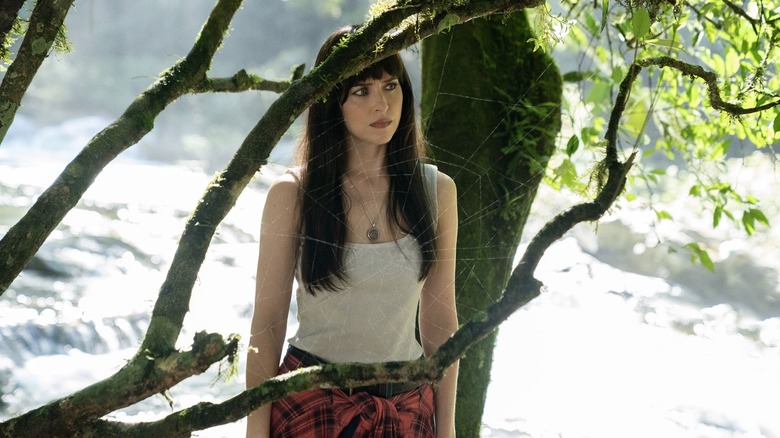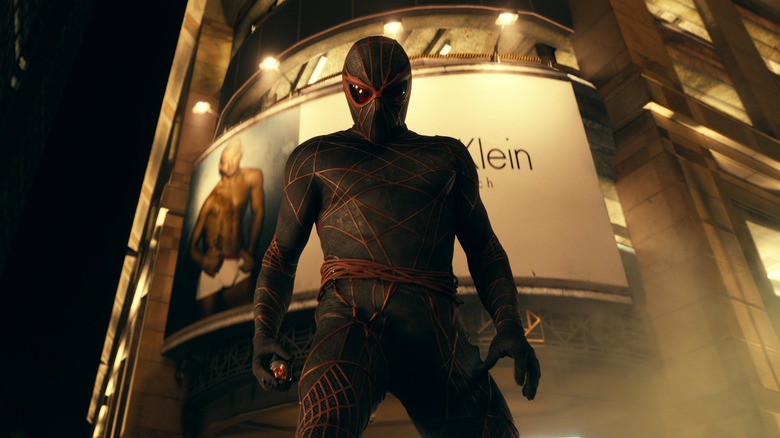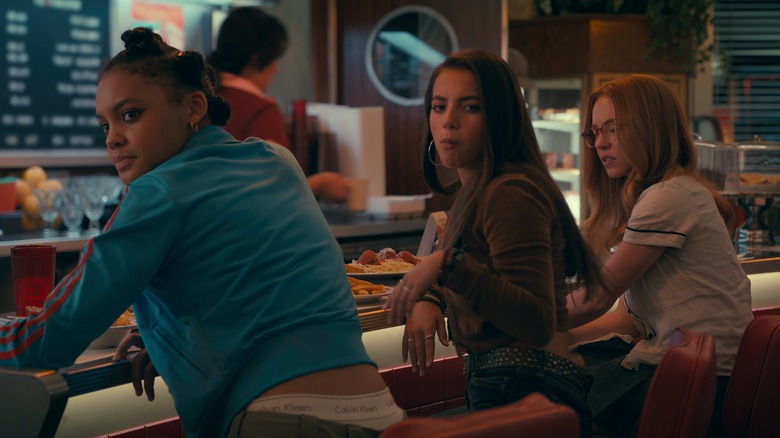A Marvel Flop Is Seeing Success On Netflix
"Madame Web," released on Abraham Lincoln's birthday, frustrated audiences everywhere with its bizarre scripting, its lack of action, its weirdly unmotivated villain, and its staunch refusal to depict its lead characters actually turning into the superheroines they were destined to become. The title character was Cassandra Webb (Dakota Johnson) a New York paramedic in 2003 who discovers she has clairvoyant powers. She traces the origin of her powers back to her birth in the Amazon rainforests, where a rare, mystical spider bit her pregnant mother. Her powers also bring her inexplicably into the company of three New York teenagers (Sydney Sweeney, Isabela Merced, Celeste O'Connor) who will all become Spider-Women someday — but not in this film.
Chasing the quartet is Spider-Man (Tahar Rahim), or rather an evil precursor to Spider-Man who has the same super-strength, the same costume, the same wall-crawling powers, and who shares Madame Web's talent for clairvoyance. He has seen a future wherein the unformed Spider-Women will team up to kill him, and he aims to murder the teens before that can happen. The future is female, he sees — three Spider-Women will replace Spider-Man — and he can't stand that idea, making him eager to kill three female characters merely so the male hero can persist. In this regard, "Madame Web" is refreshingly timely.
"Madame Web" was made for about $100 million, but only made $100 million at the worldwide box office, constituting a flop. Critics were also unkind, and S.J. Clarkson's film only sports an 11% approval rating on Rotten Tomatoes. One of the positive reviews came from /Film.
"Madame Web" is currently #1 on Netflix.
Audiences seem curious enough to witness the wreckage for themselves. The flick is proving popular. Despite a bad reputation — or more likely because of it — this movie is attracting eyeballs.
Everyone loves Evil Spider-Man
Some audiences may also be interested to see how "Madame Web" connects to the more recent Spider-Man films starring Tom Holland. Cassandra Webb's closest co-worker is Ben Parker (Adam Scott), better known to Spider-Man fans as Uncle Ben, the character whose preventable death motivated Peter Parker to become Spider-Man in the first place. Ben teases Cassie by telling her that he just started seeing someone (obviously Aunt May), and his sister Mary (Emma Roberts) is very pregnant with a son, who will very likely be named Peter.
Given the 2003 setting, "Madame Web" would indeed fall in line with the Spider-Man pictures set in the Marvel Cinematic Universe; Peter Parker's age syncs up perfectly. Sony's Spider-films do indeed connect with the MCU as seen in "Venom: Let There Be Carnage," "Spider-Man: No Way Home," and "Morbius," although many lingering MCU fans would be happy to contest this statement and reject turkeys like "Morbius" and "Madame Web" as being connected to their favorite flicks.
More than anything, audiences may be watching "Madame Web" out of morbid curiosity. It wasn't merely panned, but became roundly mocked for its silliness and writing. "Madame Web" will be the subject of an episode of the comedy podcast "How Did this Get Made?", and one needn't look too deeply into the YouTube film pundit scene to find breathless fanatics calling it the worst movie of all time.
It's not the worst movie of all time by a long shot (seriously, see more movies), and many might even find it enjoyable; I loved the hang-out, slumber party vibe it gave off when the four lead characters were together. Plus, it features pretty people like Johnson, Sweeney, and Scott doing their darnedest to make their roles dynamic and fun.
Madame Web could mark the end of an era
The /Film review (written by yours truly) declared that "Madame Web" might be the final superhero movie. Of course additional superhero films are currently being made — "Superman," "The Fantastic Four," and "Deadpool & Wolverine" are all still on the horizon and some of them might even be big hits, but "Madame Web" feels like something has ended, like a door is closing. The superhero trend has been dominant in Hollywood for a solid 15 years, stretching all the way back to the release of "Iron Man" in 2008. They struck at the right time, when movie visual effects were good enough to finally realize comic book characters on the big screen, and a generation's 9/11 trauma had fermented into an intoxicating draft of escapist fodder. By the time "The Avengers" was released in 2012, superheroes were allowed to metaphorically defend New York from faceless terrorist/alien attackers.
Marvel Studios began selling their movies as a Cinematic Universe, using their interconnectivity as the central selling point. Plot points in one movie would pay off in another, and every new character came with a promise: They would meet another star character multiple flicks down the line. The formula was powerful enough to sustain 70% of the internet's film conversations for a decade and a half.
"Madame Web" did the same thing as the MCU. It bolstered an obscure character as a key figure in another, better-known character's backstory, all while promising more mayhem in potential sequels. But "Madame Web" proved that such connections/foreshadowing aren't instant audience bait anymore. In 2023, there were more high-profile superhero bombs than hits. The genre officially died as a cultural force. 2024's "Madame Web" was the proof. It's the goodbye-wave on the way out. That's what people want to see.


